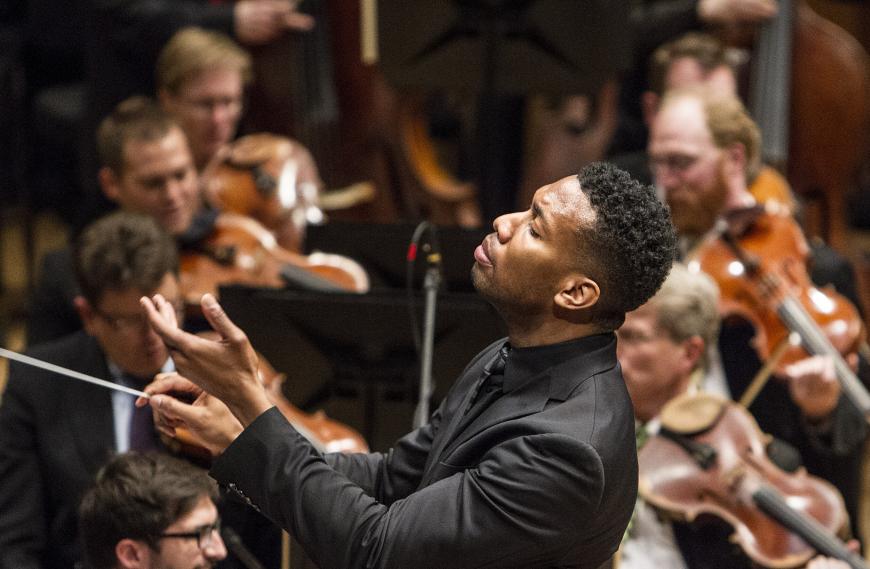
Born in Macon, Georgia, Roderick Cox became enamored of music as a child attending the Seventh Day Adventist Church, where his mother sang in the choir. Taking up the French horn, he eventually attended the Schwob School of Music at Columbia State University before attending Northwestern University and graduating with a master’s degree in conducting in 2011. Studying with Mallory Thompson and Victor Yampolsky, Cox, an African American, has since seen his star rise in this very competitive field.
Indeed, as the winner of the 2018 Georg Solti Conducting Award from the U.S. Solti Foundation, 33-year-old Cox, who is based in Berlin, has been praised as a conductor who is “paving the way” (NBC News), with the Minnesota Star Tribune hailing him as a “trailblazer ... a conductor who will be amongst the vanguard.” Finding success in the States and abroad, the musician has appeared with, among others, the Los Angeles Philharmonic, Cleveland Orchestra, Houston Grand Opera, and London’s Philharmonia Orchestra.
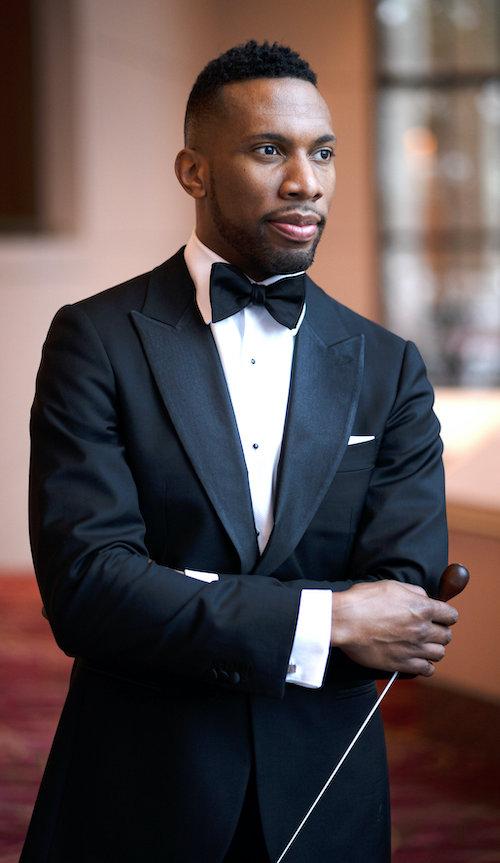
Moving at a breakneck pace, Cox was slated to make his debut at the Metropolitan Opera and San Francisco Opera — both with Rossini’s The Barber of Seville — as well as appear with the LA Phil at the Hollywood Bowl, Aspen Music Festival Chamber Orchestra, and with the New York Philharmonic (Young Peoples Concerts). These concerts, as musicians know all too well, were canceled because of COVID-19.
Then SF Opera made an offer he couldn’t refuse: Determined to return to live performances, the organization’s general director, Matthew Shilvock, re-envisioned Rossini’s comic masterpiece in a new production that would be presented in a drive-in setting at San Rafael’s Marin Center. Marking the company’s first live performances since the beginning of the pandemic, the beloved work runs for 11 performances beginning April 23 – May 15, and has been adapted by director Matthew Ozawa.
Sung in English, the production now runs a sleek, intermissionless 90-minutes, sans chorus and several characters, but with 17 musicians. And it will take place on the unit set originally intended for SFO’s new production of Beethoven’s Fidelio, also postponed because of the pandemic.
Contributing to the unique drive-in experience, Bay Area designer Alexander V. Nichols’s set and projection designs will take on the appearance of the War Memorial Opera House’s backstage dressing rooms, and singers, including baritone Lucas Meachem in the title role and mezzo-soprano Daniela Mack as Rosina (Laura Krumm sings the final three performances), will be sporting new costumes designed by Jessica Jahn, while lighting for the open-air production is provided by JAX Messenger.
I spoke with Cox by phone from Marin County, where he had managed to squeeze in a workout in addition to rehearsing. We chatted about an array of topics, from the protocols of mounting a live performance in the time of COVID to making it as a Black conductor in a white-dominated arena.

First of all, how have you been faring during the pandemic and have you spent most of this past year in Berlin? Also: Have you been vaxxed yet?
I am vaxxed, and spent most of the pandemic in Berlin, but I’m fortunate to have an American passport and a German visa, which has allowed me to travel home and work with orchestras here and there. My schedule has taken a variety of hits like many artists, but I’ve also realized that I’ve been fortunate to put together a few concerts in different places.
How does one go from singing in church to being a world-class conductor — and aside from your mother’s singing, was there music in your family?
I don’t consider them classical musicians, but music was important in my upbringing. It was almost required or expected that we go to church each Saturday and it was also expected that we would participate in the musical ensemble. For me, I was always fascinated with going to my mother’s rehearsals on Friday nights, but not many kids would like that. I enjoyed seeing the rehearsal process and seeing it all come together.
As I grew older and my ear developed, I received more training and music evolved for me in a natural way. I never thought I’d become a conductor with a professional orchestra or be doing what I do now, but Macon [Georgia] had a robust music education program and I thought I would become a music educator.
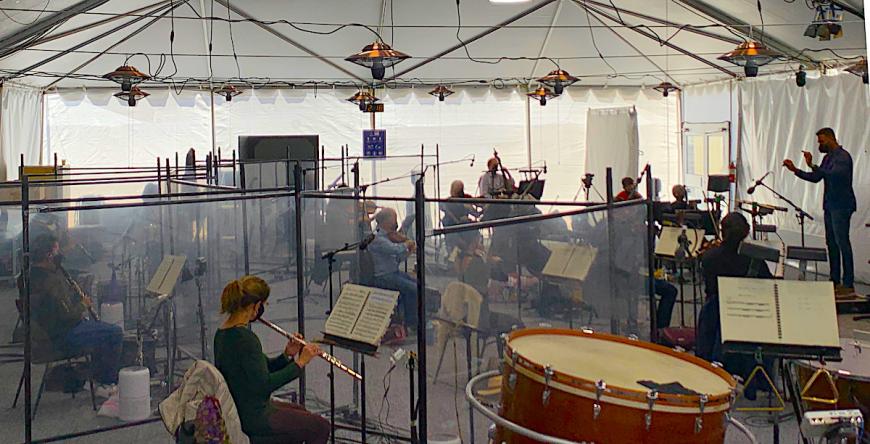
And the rest, as they say, is history. Is this your first Barber, and had you worked with any of the singers or backstage personnel before?
No, I hadn’t, and like with most of COVID, it’s been a new experience. We’ve all had to remain flexible — and focused. I was slated to do [Barber] at the Met, and when you’re preparing for an opera, especially one you haven’t done before, you prepare years in advance. So when I was told this was going to be in English, the first thing I did was drop everything and open a bottle of wine.
A man after my own heart. And then?
I gave it some thought and decided that I had signed a contract to do a performance with SFO and therefore it’s my duty to see this project through. The cast is willing to do it, the director is willing, so it makes no sense for me to pull out. That’s a way an artist can and should roll with the punches during COVID.
What are the health protocols involved in presenting such a well-known work under these trying circumstances?
I have to conform to so many abnormal things in terms of making music. Yes, it’s more challenging, but it has many, many positives. When we arrived, I had to quarantine, but when we saw the set being erected, we knew this was going to be a big deal and a history-making moment — not only for San Francisco Opera, but for the entire country.
We all rehearse in masks, but I won’t wear a mask during the performance and the singers are always distanced. The artistic genius of Matthew [Ozawa] is [how] he imagined and staged the opera in a distanced performance. It’s fascinating.
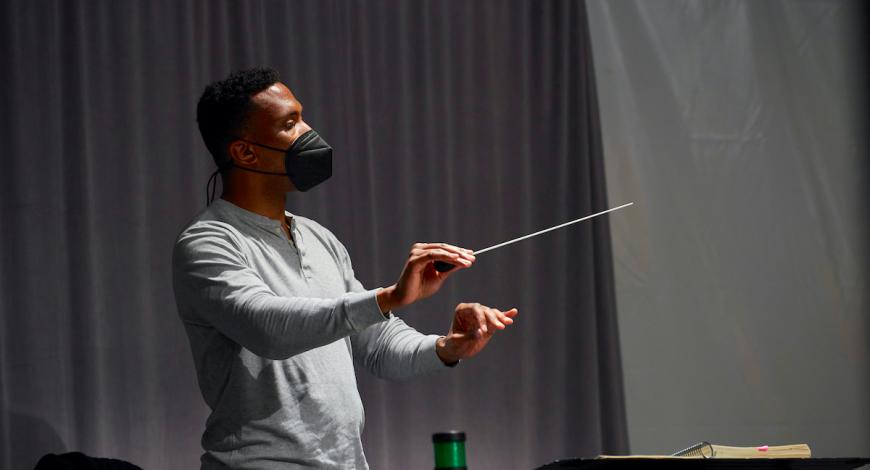
And where are you — is there a so-called orchestra pit?
We have our own tent — the orchestra tent — with microphones, cameras, and proper distancing.
I’m in another location from the singers, but we have a world-class sound and video crew, and the stage was built for the Coachella [Valley Music and Arts] Festival. It’s actually a type of place where Beyoncé could sing. It’s not one of these small stages erected in a local park or for a community concert.
What would Rossini have made of this production and how many, well, cars will be in attendance?
I don’t think Rossini could ever have imagined such a thing, and would think he’d be opposed to it being in English. Many of us would prefer it not be in English, but with the nature of this particular performance we wanted it to be accessible to people outside of the house.
In the immediate area in front of the stage there can be 200 vehicles. There’s also an overflow area where people can park and watch a huge movie screen. It’s set in a beautiful location by the lake and can [accommodate] another 400 cars.
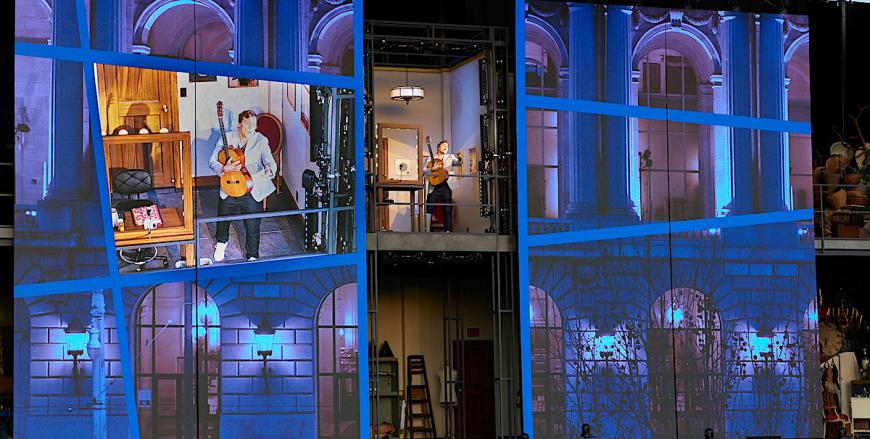
On a far different note, why do you think there’s been a dearth of Black conductors in classical music, and has race ever been a factor in your career?
I don’t have the answer to the first part and I suppose that question needs more context [but] when you look at the history of this country, especially in the arts, it’s no surprise there’s a lack thereof in terms of racial equity. To your second question, I think that I am not aware, myself, that race has ever played an issue in my career.
Sometimes it’s a bit annoying that the adjective of race is put in front of your name as a conductor. I’m an American conductor, but I found that whenever I step in front of an orchestra, the musicians have always been focused on the music, they don’t necessarily care about race — at least to my perception. I’ve always stayed focused on the job I have to do as a conductor and as a musician. I am not aware of any hurdles or any sort of racism by any musician or company in my career, but that could be different for other colleagues.
You have to address the issues, and organizations are starting to work harder to educate themselves about artists who are outside of their normal way of thinking. It forces us to reconcile with our rather limited education from a conservatory, where we were only taught the Beethovens, the Mozarts — that this is the repertory one should concentrate on. Because of that, we’ve only scratched the surface and have overlooked many fantastic and amazing composers who are living and dead [and] who should also be in our repertory.
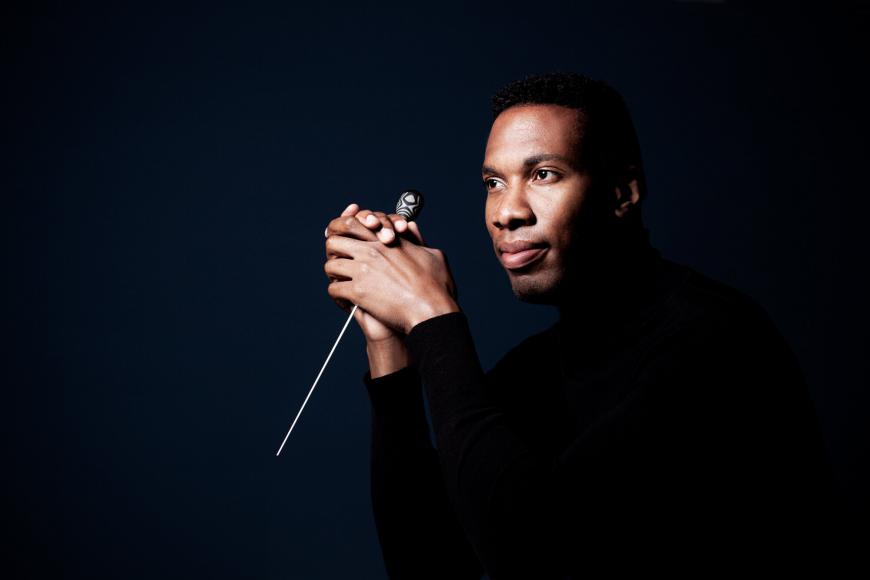
To that end and while you were Associate Conductor of the Minnesota Orchestra in 2016 for three seasons, you founded the Roderick Cox Music Initiative (RCMI) in 2018. That project helps provide scholarship funds to young musicians of color from unrepresented communities, allowing them to pay for instruments, music lessons, and summer camps. How has that been going and what advice do you have for aspiring conductors?
It’s going well. We raised nearly $200,000 in a few years and have given out $35,000 of that to 17 students from Walker West Music Academy and MacPhail [Center for Music] in the Twin Cities. It’s meant a lot, not only as an artist, to talk about a career and give advice, but to alleviate some financial stress for students.
If someone wants to be a classical musician or conductor, then you must ask yourself, “Are you willing to make the sacrifices you need to make and truly dedicate yourself to music and become a servant of music?” Because what we do is not a job, it’s a lifestyle. Music is often the first thing you think of in the morning and when you go to bed at night, and with great determination and fire in your belly [you must] not let anything get in the way of achieving your goals. Always understand that you will become your most important teacher and you have to continue to dedicate yourself to this art form.



